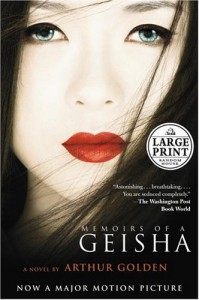A Reading Vocation
"I Must Read, Read, and Read. It is my Vocation." - Thomas Merton
This is where I chronicle my reading life. I also blog about writing at Lacey's Late-night Editing.
Book 16/100: Memoirs of a Geisha by Arthur Golden (plus movie review)


Around the Year Reading Challenge Item #2: A book set in a different continent
The more historical fiction I read, the more I wonder whether it's just not the genre for me, even though I like history and the ability to travel "back in time" through reading.
But despite all the accolades this book has received, I kept wondering when the story was actually going to get STARTED. To me, the book primarily felt like a way for the author to show off his intimate knowledge of Japanese history and "Geisha" culture. The minutiae of the historical details, from the designs on the kimonos to the classes Geisha took, got to be a little much for me, especially since this book fell into the common pitfall of historical fiction, in which events that seem important enough to be dramatized in scenes are skimmed over in summary instead.
The characters were believable, and some of them were intriguing. I was especially interested in Mameha. But I didn't like how much of the book was centered around girl-on-girl aggression, "mean girl" tactics, and female jealousy. About halfway into the book, I found myself thinking, "Huh, I didn't know this book was going to be mostly about female rivalry."
The love story was only moderately satisfying to me -- I could understand why Sayuri was so drawn to The Chairman, but [ the fact that he picked her out as a female of interest when she was just a child was a little creepy to me, even though it seems like it was supposed to be romantic. Also, it's hard for me to get swept away in a love story in which one of the characters is married throughout its entire duration.]
I did like the way this book explored issues of privilege and choice -- despite the luxurious and glamorous lives that some geisha lived, and despite the satisfaction they drew from their profession, they are still essentially slaves who must make their decisions out of necessity rather than any true agency or desire. Sayuri's desire to set her own course despite these restrictions creates most of the tension in the second half of the book, and while I could understand her reasons for doing the things she did, I still found myself feeling a little annoyed with her. [ After all, it does seem ungrateful and misleading to express her deep affection for Nobu, to coax him into warm feelings for when he has a right to feel hurt or angry, and to depend on him to keep her safe during the war, all the ultimately decide she will never become romantically involved with him. Despite her lack of agency, it felt like she "used" Nobu from beginning to end, and I don't feel entirely okay about the fact that she is ultimately rewarded for this behavior.]
Overall, I am not sorry I read this, and the book's second half definitely moves along at a better pace than the beginning. But I remain somewhat suspicious of a Western, white man's interpretation of a Japanese woman's life, even if he did hold advanced degrees in Japanese history, especially since he gives her the incongruous and Western-valued blue eyes. I would have much rather read a real memoir from a real geisha.
A note on the movie: This is one of those rare instances in which I rated the movie higher than the book. I gave the movie 4 stars. It was visually beautiful, and it was also faithful to the book without getting bogged down in so many of the details. There were a few things I would have done differently -- [I would have included the full impact of the mizuage rather than just skimming over it by saying who was the highest bidder; it also softened the blow of the Baron's molestation of Sayuri by not showing the way he jerked off in her presence. I also was not sure that the subtleties of Sayuri's choice to sleep with the minister at the end came across without the stronger theme in the book of Sayuri's desire to avoid tying herself to Nobu.] So I think this is a movie best enjoyed after reading the book, and even then, perhaps only if, like me, you didn't like the book all that much, anyway. (A friend of mine who liked the book thought the movie was awful.)
There's an interesting article about the Japanese reaction to the movie here: https://www.quora.com/How-do-Japanese...



